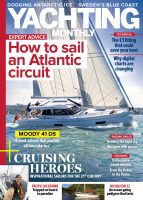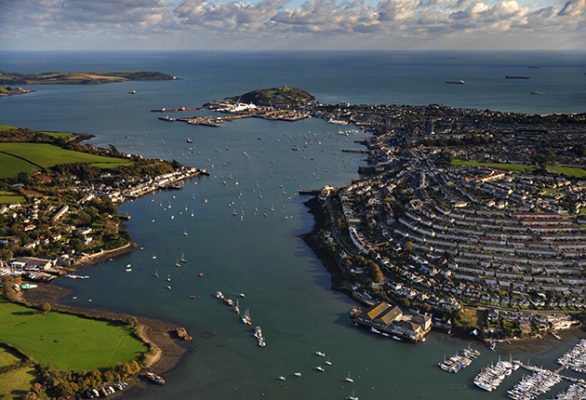Falmouth Harbour Commissioners is taking steps to protect the Flushing seagrass bed and is seeking feedback from sailors
The seagrass bed at Flushing is being given extra protection, as part of moves by Falmouth Harbour Commissioners to preserve this important marine habitat.
Harbour authorities removed 11 swinging moorings, which were laying over the bed, at the start of the 2021 sailing season.
Swinging moorings can cause abrasion on the seabed, where the chain comes into contact with the bottom.
A seagrass regeneration area has now been established at Flushing, marked with two new Advanced Mooring Systems (AMS) also known as eco moorings.

The black hatched area identifies the seagrass regeneration area at Flushing. The eco moorings are marked in green. Credit: Falmouth Harbour
Initially, these will be used for demarcation purposes only.
There are plans to start trialling a yacht mooring on the AMS later in the year.
Scientists from the University of Exeter will be monitoring the seagrass under the new moorings to measure how the plant regenerates.

The seagrass bed outside Flushing is marked in red, although it may have spread slightly. The yellow dots identify the 11 swinging moorings which have now been removed. Credit: Falmouth Harbour
To assist with this, harbour users are being asked not to anchor or use equipment that impacts on the seagrass regeneration area.
Falmouth Harbour sits within the Fal and Helford Special Areas of Conservation (SAC) designated due to the presence of 6 features. Seagrass and maerl are an important part of some of these features.
The chief executive of Falmouth Harbour, Miles Carden said it was keen to engage with recreational sailors on the trial.
‘We are keen not to have a conflict position like in Studland Bay. As a harbour, we are keen to move to a sustainable position, but we need to make sure what we do is viable for a commercial and leisure harbour,’ he said.
Those with comments or have had experiences of using AMS can email the harbour at: info@falmouthharbour.co.uk
Continues below…
UK Coastal walks for cruisers: 10 of the best
Uncertainty about sailing overseas due to COVID-19 will see many of us cruising closer to home this season. New experiences…
Summer cruising: the 40 best UK anchorages
Planning your summer sailing? Yachting Monthly experts share their favourite UK anchorages, with tips to make the most of your…
Voluntary no anchor zone for Studland Bay
A voluntary no anchor zone will be introduced at Studland Bay in Dorset from December 2021 before it is extended…
Eco friendly sailing: Best practice for green yachting
How easy is it to go eco friendly sailing? We look at the steps cruisers can take to minimise their…
The effectiveness of eco moorings have been called into question by some sailors.
Concerns include: Do AMS offer adequate protection from wave impact? Will the line of floats and chain get tangled up in heavy seas? Will the line of floats and chain get stretched out by the wind and waves causing a potential hazard to boats?
The type of AMS being used by Falmouth Harbour has a block to anchor it to the seabed, then several small buoys attached to the riser chain to keep the chain off the seabed, with a larger buoy on the surface.
Carden said Falmouth Harbour, which maintains over 600 moorings, shared these ‘significant concerns’ and he hoped the trial would address these issues.
‘We are looking to see if these moorings are practical and safe to use in a harbour environment. We have to do something to protect the seagrass but we don’t underestimate the challenge. We are keen to work with the industry, especially the recreational yachting sector so we have a sound evidence base and don’t make snap decisions,’ he stressed.
Using an alternative to plastic floats on the AMS is also being examined.

Seagrass is a vital marine habitat for a variety of species and an incredible carbon sink. Credit: Lewis Jefferies / WWF-UK
Carden highlighted that there were currently no plans to replace every mooring in Falmouth with AMS and it would be only considered in environmentally sensitive areas, or on the fringes of these areas.
He also acknowledged that AMS are more expensive than traditional moorings. Due to the use of more floats, they also need more maintenance.
‘There is a supply chain opportunity here. We have used traditional fishing floats on our AMS but there may be different solutions to plastic which we could use,’ he said.
Carden said he expected AMS to be introduced in some parts of Falmouth Harbour within five years, although it was a five to 10 year project.
The Flushing seagrass regeneration area is part of the wider £2.5 million LIFE Recreation ReMEDIES project, which is led by Natural England, and aims to examine the pros and cons of environmentally friendly moorings, as well as provide voluntary codes, targeted training and habitat restoration.
It is focused on five Marine Protected Areas in southern England: Isles of Scilly, Fal & Helford, Plymouth Sound & Estuaries, Solent Maritime, and Essex Estuaries Special Areas of Conservation.
The project, which runs until October 2023, has already collaborated with The Green Blue to publish The Green Guide to Anchoring and Moorings.
It is free and available here.
A study looking at seagrass loss in the UK, which was published in March 2021, has revealed that at least 44% has disappeared since 1936; 39% of that loss has occurred since the 1980s.
Pollution, mining, farming as well as dredging, bottom trawling, anchoring and coastal development have all contributed to the decline.
Enjoyed reading Seagrass restoration trial begins in Falmouth Harbour?
A subscription to Yachting Monthly magazine costs around 40% less than the cover price.
Print and digital editions are available through Magazines Direct – where you can also find the latest deals.
YM is packed with information to help you get the most from your time on the water.
-
-
- Take your seamanship to the next level with tips, advice and skills from our experts
- Impartial in-depth reviews of the latest yachts and equipment
- Cruising guides to help you reach those dream destinations
-
Follow us on Facebook, Twitter and Instagram.








